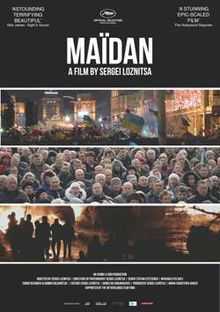Maidan (film)
| Maidan | |
|---|---|
 Theatrical release poster | |
| Directed by | Sergei Loznitsa |
| Produced by |
Sergei Loznitsa Maria Baker |
| Cinematography |
Sergei Loznitsa Serhiy Stetsenko Mykhailo Yelchev |
| Edited by |
Sergei Loznitsa Danielius Kokanauskis |
Production company |
Atoms & Void |
| Distributed by |
United States: The Cinema Guild France: ARP Sélection |
Release dates |
|
Running time | 130 minutes |
| Country |
Ukraine Netherlands |
| Language | Ukrainian |
Maidan is a 2014 documentary film, directed by Sergei Loznitsa. It focus on the Euromaidan movement of 2013 and 2014 in the Ukraine's capital Kiev at Maidan Nezalezhnosti (Independence Square). It was filmed during the protest of revolution and depicts different aspects of it, from the peaceful rallies to bloody protests between police and civilians.[1][2]
The film premiered on May 21, 2014 at 2014 Cannes Film Festival.[3] It had a theatrical release in US on December 12, 2014.[4]
Synopsis
The follow explores and follows the civil riots in Kiev's Maidan Nezalezhnosti (Independence Square), to overthrow President Viktor Yanukovych.
Releases
After its premiere at Cannes, the film had a theatrical release in France on May 23, 2014. The film released in Ukraine on July 24, 2014.[5] It had a limited release in US on December 12, 2014 before expanding world wide on February 20, 2015, which will coincide with the date of revolution in Ukraine.[6]
Reception
The film has received positive reception from critic. Review aggregator Rotten Tomatoes reports that 100% of 20 film critics have given the film a positive review, with a rating average of 7.7 out of 10.[7] On Metacritic, which assigns a weighted mean rating out of 100 reviews from film critics, the film holds an average score of 86, based on 9 reviews, indicating a 'Universal acclaim' response.[8]
Leslie Felperin of The Hollywood Reporter gave the film a positive review and said that "This stunning, epic-scaled film harkens back to the heroic, journalistic roots of documentary-making and yet feels ineffably modern and formally daring."[9] In his review for Variety said that "In contrast with most documentaries made in the wake of an historic event, "Maidan" will last beyond the current Ukrainian upheaval to stand as compelling witness and a model response to a seminal moment too fresh to be fully processed."[10] Lee Marshal reviewing the film for Screen International said that "Even in the midst of the moltovs, Loznitsa's sincere and memorable document retains its fascination with those small details that make us human, and make democracy worth fighting for."[11] Michael Atkinson of The Village Voice called it "Easily the most rigorous, vital, and powerful movie of 2014, Sergei Loznitsa's Maidan may be a perfect Bazinian cinema-machine - reality is captured, crystallized, honored for its organic complexity, and delivered unpoisoned by exposition or emphasis."[12] Andrew Pulver writing his review for The Guardian said that "In some ways it's perfect, in its Eisenstein-esque refusal to compromise on the idea of the crowd as the key participant. In other ways, though, its sternness hampers it."[13]
Howard Feinstein of Filmmaker Magazine in his review siad that "Maidan is gorgeous if stark. It never crosses the line into aestheticizing the revolution, the suffering and brutality that come along with it. Its artfulness stems from obsessive precision. You register Maidan just as you do the well-known paintings of horror from, say, the Spanish Civil War and the French Revolution: Not an interpretation, but an artwork capturing the truth of a historic moment."[14] Daniel Walber of Nonfics, called the film "a portrait of a people, a place and a moment rather than a dissertation on its context or implications. It is raw, unflinching cinema for a troubled nation in a great and terrible moment."[15] Oleg Ivanov of Slant Magazine gave the film three out of four stars by saying that "It puts the viewer inside Maidan, allowing them to draw their own conclusions about the ideas and agendas espoused by the movement's leaders and participants."[16]
References
- ↑ "Documentary 'Maidan' polarizes participants in Ukraine revolution". Retrieved January 9, 2015.
- ↑ "Inside ‘Maidan’: Sergei Loznitsa on His Ukrainian Uprising Doc and Putin’s ‘Fascist’ Regime". Retrieved January 9, 2015.
- ↑ "Cinema Guild Picks Up 'Maidan,' Sergei Loznitsa's Cannes Doc About Ukraine Revolution". Retrieved January 9, 2015.
- ↑ "MAIDAN opens on Friday, December 12 exclusively at FSLC for one week only". Retrieved January 9, 2015.
- ↑ "DOCUMENTARY "MAIDAN" BY SERGIY LOZNYTSYA WILL BE RELEASED IN JULY". Retrieved January 9, 2015.
- ↑ "Dogwoof Take UK Rights For Ukranian Doc Maidan". Retrieved January 9, 2015.
- ↑ "Maidan (2014)". Rotten Tomatoes. Flixster. Retrieved 9 January 2015.
- ↑ "Maidan (2014): Reviews". Metacritic. CNET Networks. Retrieved 2015-09-01.
- ↑ "'Maidan': Cannes Review". Retrieved January 9, 2015.
- ↑ "Film Review: ‘Maidan’". Retrieved January 9, 2015.
- ↑ "Maidan". Retrieved January 9, 2015.
- ↑ "Maidan Reveals a Ukrainian Uprising -- and the Crackdown". Retrieved January 9, 2015.
- ↑ "Cannes 2014: Maidan review – an unblinking look at Ukraine's history in action". Retrieved January 9, 2015.
- ↑ "Never the Twain Shall Meet: Maidan". Retrieved January 9, 2015.
- ↑ "‘Maidan’ Review: A Grand, Unflinching Epic of the Ukrainian Revolution". Retrieved January 9, 2015.
- ↑ "FILM REVIEW". Retrieved January 9, 2015.
External links
- Maidan at the Internet Movie Database
- Maidan at Rotten Tomatoes
- Maidan at Metacritic